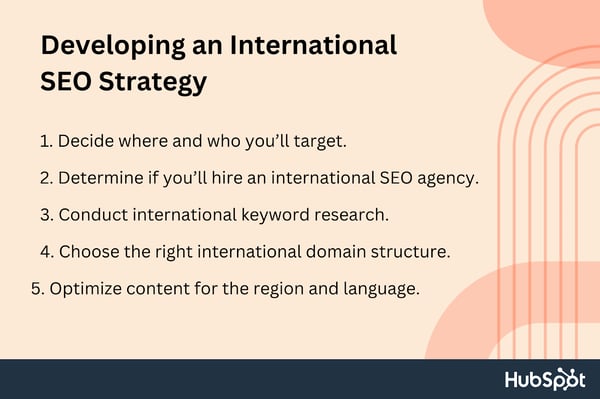Maximizing for the World: Learning International SEO Techniques
Maximizing for the World: Learning International SEO Techniques
Blog Article
Browsing the Digital Landscape: Leveraging International Search Engine Optimization for Cross-Border Success
In today's interconnected electronic world, organizations are progressively looking beyond borders to take advantage of worldwide markets. Leveraging seo (SEARCH ENGINE OPTIMIZATION) strategies customized for worldwide target markets is crucial for accomplishing cross-border success. The intricacy of browsing the electronic landscape on an international range demands a nuanced method, from recognizing the principles of International SEO to executing geotargeting and multilingual key words methods. As companies make every effort to increase their reach and visibility throughout various areas, optimizing site frameworks and monitoring cross-border efficiency come to be vital components of an effective international SEO strategy.
Comprehending International Search Engine Optimization Principles
Browsing the complexities of worldwide SEO needs a solid grasp of essential concepts to successfully broaden on the internet exposure across borders. One critical element of worldwide SEO is recognizing the relevance of localization.
Additionally, having a clear understanding of geo-targeting is important. This involves suggesting to search engines the details nations or regions a site is targeting. Carrying out hreflang tags is one method to interact this information, guaranteeing that the appropriate version of a web page shows up in the search results page for an individual in a specific location.
Moreover, understanding the influence of local online search engine and social media sites systems is vital for global SEO success. While Google is leading in numerous areas, countries like China have their own search engines like Baidu, calling for tailored approaches for each system to take full advantage of online visibility (International SEO).

Targeting Multilingual Search Phrase Approaches
Developing multilingual keyword approaches is vital for successfully reaching diverse global target markets and taking full advantage of on-line visibility throughout different linguistic areas. When targeting multilingual key phrase techniques, it is essential to carry out detailed research study to comprehend the specific search terms and expressions utilized by the target audience in each linguistic region. This entails not just translating keyword phrases but additionally considering cultural subtleties, regional languages, and search fads unique to every target audience.
To produce a successful multilingual keyword phrase strategy, it is essential to focus on importance and search intent. Keywords must line up with the web content on the website and reverberate with the social context of the target market. Making use of devices such as Google Keyword Coordinator, SEMrush, or Ahrefs can help recognize high-performing keywords in various languages and examine their search quantity and competition degree.
In addition, monitoring and evaluating the efficiency of multilingual key words regularly is vital for enhancing and refining the strategy over time. By constantly adapting to modifications in search behavior and patterns, organizations can boost their on the internet exposure and bring in even more worldwide traffic to their websites.
Implementing Geotargeting and Hreflang Tags
When intending to improve international search engine optimization strategies, integrating geotargeting and hreflang tags is essential for enhancing website visibility throughout various regions. Geotargeting involves customizing web content to certain areas, making sure that customers in various locations get relevant details. By implementing geotargeting, companies can enhance their regional search positions and attract region-specific website traffic.

Optimizing Web Site Structure for Worldwide Exposure
To even more boost global SEO approaches beyond geotargeting and hreflang tags, optimizing the site framework is vital for accomplishing international presence and making the most of reach across different areas. A well-structured internet site not just enhances customer more tips here experience however additionally promotes site link online search engine spiders in comprehending the web content and context of the website. When going for worldwide presence, it is important to guarantee that the internet site is organized in a logical manner that deals with users from various nations. Carrying out a clear hierarchy with unique groups and subcategories can assist in enhancing the site's navigating and user-friendliness.
In addition, creating language-specific subdirectories or subdomains can aid internet search engine supply the appropriate variation of the internet site to customers based upon their language preferences, better enhancing the total user experience. Additionally, optimizing link frameworks to include pertinent key words and geotargeted terms can enhance the website's presence in various regions. By structuring the internet site effectively for global target markets, companies can raise their possibilities of bring in global website traffic and increasing their reach throughout boundaries.

Tracking and Examining Cross-Border Performance
Efficient surveillance and analyzing of cross-border efficiency is essential for assessing the success of worldwide search engine optimization techniques and identifying opportunities for improvement in global reach and exposure. By very closely tracking essential efficiency indications (KPIs) across different markets, companies can obtain beneficial insights into the effectiveness of their cross-border SEO initiatives. Monitoring metrics such as natural website traffic, keyword positions, conversion rates, and bounce rates can supply an extensive sight of how well a site is performing in various areas.
By contrasting efficiency throughout different nations, regions, or languages, firms can identify successful strategies and center content to much better provide to certain target audiences (International SEO). Routine analysis of Search engine optimization performance on a global scale guarantees that business can adjust their techniques swiftly to take advantage of on arising chances and maintain an affordable edge in worldwide markets.
Final Thought
Finally, international SEO plays a vital role in achieving cross-border success click reference by optimizing web sites for international visibility, targeting multilingual key words methods, applying geotargeting and hreflang tags, and keeping track of cross-border efficiency. By recognizing the principles of worldwide SEO and optimizing internet site structures accordingly, services can effectively reach and engage with their target audiences across different areas and languages. This critical approach is vital for increasing market reach and driving on-line growth in today's digital landscape.
Report this page